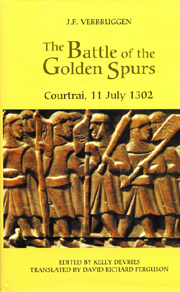 The Battle of the Golden Spurs (Courtrai, 11 July 1302)
The Battle of the Golden Spurs (Courtrai, 11 July 1302) Book contents
- Frontmatter
- Contents
- List of Illustrations
- General Editor's Preface
- Editor's Introduction to the 2002 edition
- Foreword to the 1952 edition
- Acknowledgements (to the 1952 edition)
- Preface: ‘An almost impossible event …’
- Introduction
- Part One Historiography and the Study of the Sources
- Part Two Historical Overview of the 1302 Campaign
- General Conclusion
- Bibliography
- Index
General Conclusion
Published online by Cambridge University Press: 12 September 2012
- Frontmatter
- Contents
- List of Illustrations
- General Editor's Preface
- Editor's Introduction to the 2002 edition
- Foreword to the 1952 edition
- Acknowledgements (to the 1952 edition)
- Preface: ‘An almost impossible event …’
- Introduction
- Part One Historiography and the Study of the Sources
- Part Two Historical Overview of the 1302 Campaign
- General Conclusion
- Bibliography
- Index
Summary
With the Battle of Courtrai, the epic story of the Flemish townsmen began. They liberated the rest of their county and held out against the most powerful monarchy of their time for two years. A new punitive expedition by Philip the Fair led to a disorderly retreat. The military expeditions followed on from each other at a very quick tempo and the example of the men of Bruges merits special citation here. After the decisive expedition to Wijnendaal, Cassel and Courtrai they were, for the time being, left in peace while liberating Lille and Douai. However, on 30 August 1302 a communal army once again marched towards Douai and Nieuwendijk to stop the King's advance. The men remained under arms for a period of forty-one days. On 14 October, the aldermen took part in a military expedition to Gravelines, and, on 2 November a new communal army followed. During the winter, the whole frontier was defended by garrisons, and at the end of February or beginning of March 1303 they advanced again, this time in an offensive against Hainault. It was there that Lessines was conquered on 2 April with the Count of Hainault not even daring to attack those laying siege. On 23 April the men of Bruges sailed to Zeeland, with men for relief and reinforcements following them on 15 May and 11 June. A subsequent expedition led their army to Cassel, and they finally lay siege to Tournai in an expedition that lasted forty-seven days.
- Type
- Chapter
- Information
- The Battle of the Golden Spurs (Courtrai, 11 July 1302)A Contribution to the History of Flanders' War of Liberation, 1297–1305, pp. 244 - 250Publisher: Boydell & BrewerPrint publication year: 2001


